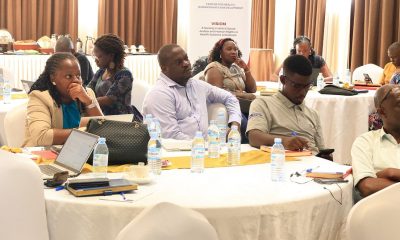Health
NWSC Assures Public of Tap Water Safety Amid Contamination Concerns in Gulu
The National Water and Sewerage Corporation (NWSC) has reaffirmed the safety and quality of its piped water, stating that it meets World Health Organization (WHO) standards when it leaves the treatment plants. The assurance follows growing concerns from residents in Gulu, particularly in Pece-Laroo Division, over frequent cases of waterborne illnesses.
During a public engagement meeting in Gulu City, Anthony Opiyo, the Deputy Town Clerk of Pece-Laroo Division, raised alarm over the safety of tap water, revealing that he often suffers from typhoid after consuming it. He claimed the same health issues do not occur when he drinks water from boreholes or streams.
Responding to these concerns, NWSC officials clarified that the water is thoroughly treated and safe at the point of supply. Proscovia Nyamungu, NWSC’s Commercial Officer for the Gulu area, explained that such illnesses are more likely due to secondary contamination that occurs after the water leaves the treatment facility.
Nyamungu pointed to several causes of contamination along the distribution network, including: Illegal water connections, Poor plumbing within households, Dirty water storage tanks, Unsanitary surroundings at public taps
She also cited cases where bricklayers and other individuals tamper with the system to draw water illegally, significantly increasing the risk of contamination.
“We test the water at both the treatment plant and various consumer points to ensure it remains safe. However, community actions and household hygiene practices can affect the quality before it’s consumed,” Nyamungu said.
Ivan Tekakwo, NWSC’s Public Relations Officer, emphasized that while NWSC maintains high-quality water standards at source, the journey through pipes can expose water to contaminants if households or community infrastructure is compromised.
Both Tekakwo and Nyamungu advised residents to boil tap water before drinking, clean water storage tanks regularly, and maintain hygiene around taps and pipes to reduce the risk of diseases like typhoid and cholera.
Residents also criticized NWSC for not giving timely alerts during routine water tank cleaning, which sometimes results in discolored or muddy tap water. Nyamungu acknowledged the communication gap and promised improved coordination going forward.
“We are working on enhancing our notification system using community WhatsApp groups and local radio announcements. When consumers report dirty water, we dispatch a team to collect samples and flush the system at no cost to the consumer,” she said.
The situation in Gulu reflects a wider national challenge. According to WHO data, Uganda loses an estimated 23,000 people annually to diarrheal diseases, with over 19,000 of those deaths occurring among children under five. Poor water, sanitation, and hygiene (WASH) practices remain the leading contributors. An additional 3,000 deaths are attributed to cholera and other waterborne diseases.
Comments



















